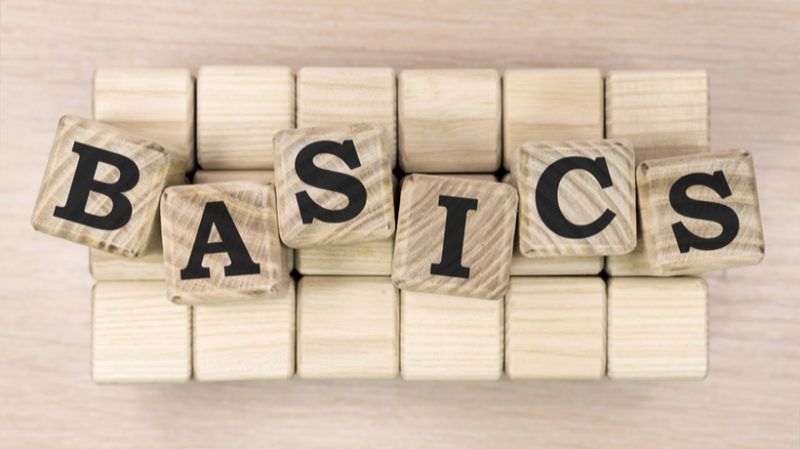A Practical Way To Cultivate A Beginner's Mind
He fumbled with the soft flesh and skin, searching for a good grip. He found it. Slowly he raised it to his mouth, biting down into it, squishing the cinnamon-coated flesh between his gums and pulling it off the floppy skin. He grinned. We had a breakthrough. He loves cinnamon-baked apples.
Teaching our son to eat through baby-led weaning has been one of the many opportunities I’ve had to see what it would be like to be a beginner again. A beginner human. The exploration, the trial, the error, the light-bulb moments. The smile of satisfaction as the gooey goodness of the baked apple dribbles down your chin. What a wonder to have a mouth! And now to discover what it can do…
These moments reveal an important ingredient for creating quality online courses. Let’s go bigger than that. This is important for leading a happy life.
You need a Beginner’s Mind.
A Beginner’s Mind is all about the mindset. When we are free from preconceived notions about something, we are willing to learn. Having a Beginner’s Mind is useful in all facets of life. Let’s explore the concept first before we talk about online courses.
Why Do We Need A Beginner’s Mind?
If you’re the expert, adopting a Beginner’s Mind is often extremely difficult for you. That’s because of something known as the Earned Dogmatism Effect.
A series of experiments by Victor Ottati at Loyola University in Chicago wanted to explore the idea that the roles we play in life change the way we behave. The research team wondered, is this also happening to people labeled as experts? Are they internalizing a role that calls for them to sound confident and end up coming across as dogmatic?
Of course, many experts know what they’re talking about and should sound confident. But the conclusion from the studies was that the role of being an expert changes the way we think and behave. We should be vigilant to the risk that our subsequent behavior, as an expert, might not reflect how we want to come across.
You know things your audience doesn’t. You have intuition, built through experience. Your mind makes leaps others don’t (yet). You have mental models and representations others still need to develop.
What If We Are Compelled To Share That Knowledge With Others?
Whether as a father or a mother, a husband or a wife, a business owner, an artist, or a knowledge worker, life is full of opportunities to share our knowledge.
“We should not hoard knowledge; we should be free from our knowledge."– Shunryu Suzuki
As someone who wanted to make a living teaching and helping others teach, my goal was to understand what it’s like to be a beginner again.
“In the beginner’s mind there are many possibilities, but in the expert’s mind there are few. ”
– Shunryu Suzuki
What common mistakes do beginners make? What important early decisions do I wish I had extra guidance for? What shortcuts can others take to speed up the learning process I cobbled together?
What Is A Beginner’s Mind?
Shoshin is a word from Zen Buddhism meaning "beginner’s mind."
It refers to an attitude of openness, eagerness, and lack of preconceptions when studying a subject, even (especially) at an advanced level, just as a beginner would.
It’s the open-minded wonder of a child. Jack Kornfield implores us to listen to Rachel Carson, the great naturalist, as she evokes it:
A child’s world is fresh and new and beautiful, full of wonder and excitement. It is our misfortune that for most of us that clear-eyed vision, that true instinct for what is beautiful and awe-inspiring, is dimmed and even lost before we reach adulthood. If I had influence with the good fairy who is supposed to preside over all children, I should ask that her gift to each child in the world be a sense of wonder so indestructible that it would last throughout life.
 kavram/Shutterstock.com
kavram/Shutterstock.com
How Do You Cultivate A Beginner’s Mind?
Jack Kornfield tells another story about how Seung Sahn, a Korean Zen master, teaches his students a “don’t know mind.” He would ask them questions like “What is love? What is consciousness? What is going to happen tomorrow?” Each time, the students would answer, “I don’t know.” “Good,” he replied. “Keep this ‘don’t know mind.’ It is an open mind, a clear mind.”
An important lesson from the story is that it involved two people, the student and the teacher, for the student to cultivate the right mindset. As an expert hoping to teach others, you must be the student. You need a partner to ask you the right questions. There are 5 more helpful approaches to accessing the Beginner’s Mind in all areas of life. Let’s examine each.
1. Yes, No, Maybe
Few things in life are black and white. Yet we are quick to jump to conclusions when we think we recognize patterns. Often these patterns are hiding unconscious biases.
Back when my wife and I first got engaged, we wanted to move to a bigger apartment, but I had just started my first business. We assumed we couldn’t afford to move out of our uptown walk-up into one of those nicer buildings with the elevator and doorman. We researched similar places in new neighborhoods instead. Nothing felt right. On a whim one day, we wandered into a few nicer places and fell in love. We thought, what if we are wrong? What if we can afford it? We spent a weekend organizing our finances, with me channeling my inner Tim Ferris (and using his Dreamline Worksheet), and realized we could do it.
Adopting an approach of “Yes, No, Maybe” to judgments you’re making forces you to consider the alternatives. If you immediately think the answer to a decision is yes or no, stop to consider why. What would an alternative answer look like? Map it out and see for yourself.
This is not to say be wishy-washy. This technique is useful before a decision is ultimately made.
2. Pay Attention To The Foundation
In any physical exercise, there are certain foundational movements you take for granted, especially as you get more advanced. It’s almost like you think, I’ve got this, I don’t really need to pay attention. For instance, in lifting weights, proper back and neck position is fundamental but something I stop paying attention to when I’m thinking about the next level up in my swoleness.
But it was in forgetting those basic movements and positioning that I got injured, and spent six months visiting a chiropractor twice a week. Don’t make my mistake; pay attention to the foundation. Set yourself up for success by not getting lazy and assuming you know how to do the basics. Pay attention to the basics. Lay the foundation for others.
 Kristsina Yakubovich/Shutterstock.com
Kristsina Yakubovich/Shutterstock.com
3. Watch The Stories You Tell Yourself
The stories in our minds are what defines much of our reality.
For example, I noticed that if someone is 10 minutes late to a meeting, I would happily tell myself they didn’t value my time. This caused me to resent them right away, and since I have the poker face of an over-eager novice holding pocket aces, they could always tell. So I worked on it. By accepting that they, like me at some point, were simply running behind, I started having more productive meetings and experiencing more serendipity.
Dan Greenwald, the founder of ThirtyTenZero, uses a technique called StoryWatch in his life improvement framework. He talks about how your past experiences, assumptions, and judgments send you into a cycle of internal storytelling and often, unnecessary suffering.
Talking through the stories you tell yourself can help you uncover hidden biases that decrease clarity and make it difficult for others to follow you.
4. Notice Your Expectations
I recently started doing yoga to complement weights and cardio work on alternate days, when I realized I was as flexible as the legs of the chair I sit on for 8+ hours a day. When the instructor says we’re going to do tougher poses, I notice my mind can go two ways. One is to think, this is going to be hard. My focus is broken. On these occasions, the pose is a struggle. Execution suffers.
The other is to think, this is going to make me stronger. I’m tuned into the challenge. On these occasions, I relish it and do feel stronger. Your expectations are known only to you, and in most cases lead to an outcome you are familiar with. But we only see the outcome. Next time you feel resistance to something, or anticipate pleasure from an experience, stop to consider why you expect that. Notice if your expectation aligns with the outcome. See if your expectation can influence the outcome.
 Lucius Conner/Shutterstock.com
Lucius Conner/Shutterstock.com
5. Use The Familiar As Your Anchor
Watching my son learn how to eat, it’s easy to see how he naturally gravitates to the familiar. We use this to our advantage. We’ll slip slices of pear into his baked apples. Strips of eggplant into his roasted butternut. We’ve even been known to mash sardines into avocado for a fishy surprise. We all do this, whenever we learn something new. We look for ways to connect new ideas to prior knowledge. As an expert though, it’s easy to forget the familiar anchors you used when you first started out.
If you want to be a great teacher, connect with the time you were a student. What analogies did you make when you started out? How did you build your understanding?
What Can You Expect From A Beginner’s Mind?
Going through the exercises I’ve listed above with someone to ask you the questions will help you get to the foundational first principles of your knowledge. You’ll have reverse-engineered your expertise to the most basic analogies and assumptions you had when you first started, and the precise order of the leaps you went through to build your understanding. You’ll have a framework for your own mental representations.
This is the framework you’ll teach to your future students.










